To some, there is no nobler goal than the pursuit of knowledge.
Knowledge Clerics come in many different forms.
Some might be professors, researchers, librarians, or academics. Within vast and ornate halls of knowledge collected and archived over the centuries, you’re certain to find a few Knowledge Clerics.
Meanwhile, others might take a more “hands-on” approach and embrace the adventuring lifestyle by favoring “field research” over the more theoretical approaches of their peers.
Still, others might find themselves as informants and advisors to those in positions of power.
If this sounds interesting to you, then let’s get right to the first lesson, shall we?
This is the full subclass guide to the Knowledge Cleric in D&D 5e!
What is the Knowledge Cleric in D&D 5e?
Fitting with the name of their Divine Domain, Knowledge Clerics value learning above all else.
These Clerics are commonly found as recordkeepers, researchers, librarians, and scholars within the temples.
Temples specifically dedicated to deities revered by Knowledge Clerics will commonly have large rooms filled with tomes containing some of the most thoroughly researched (and often esoteric) information imaginable.
The promise of new information can very quickly get these Clerics’ full attention. As such, they tend to make for excellent sources of information and will often serve as advisors or subject matter experts.
While most tend to be happy to share knowledge that they have gained, there are some that don’t share that philosophy.
Some might withhold knowledge maliciously as a means of control or leverage. Meanwhile, others simply believe that some information should only be available to certain people or under special circumstances.
Gods and Goddesses that Knowledge Clerics commonly revere include:
- Oghma, the God of Knowledge, Invention, and Inspiration
- Boccob, the God of Magic, Arcane Knowledge, Balance, and Foresight
- Aureon, the God of Magic, Knowledge, and Lore in Eberron
- Gilean, the God of Knowledge, Balance, and Learning in Dragonlance
- Thoth, Egyptian God of Learning and Writing
However, some Knowledge Clerics might find themselves drawn to a more “practical” type of knowledge.
Those who take an interest in the knowledge and practices that go into invention and craftsmanship will commonly strike friendships and share dialogues with artificers and Forge Clerics.
The Knowledge Cleric is one of seven Cleric subclasses found in the 5e Player’s Handbook.
Role in the Party
Spellcasting, utility, and information gathering are really what the Knowledge Cleric focuses on the most. Fitting with the name of the subclass, information gathering is particularly important to these characters.
Knowledge Clerics get several features that can have an incredible impact on the game.
Based on the information that these characters know and gather, they can effectively inform the party’s entire strategy in dealing with a problem!
This is especially true if we’re talking about building a plan to take on the campaign’s villain or strike decisively against a marching army of Hobgoblins. As a result, Knowledge Clerics can have a ton of influence within their party, community, or world at large.
It’s not inaccurate to think of the Knowledge Cleric as a unique mash-up of the traditional Cleric, a utility-focused Wizard, and a “skill monkey” College of Lore Bard.
The Cleric Spell list has plenty of useful options for offensive casting, healing, and buffs. So, it’s not like these characters just read a book while their allies are fighting for their lives.
Like all Divine Domain options, Knowledge Clerics can be absolute beasts in combat!
But letting the Knowledge Cleric operate before any actions are taken will help them and the party create winning strategies for (nearly) any obstacles they may face!
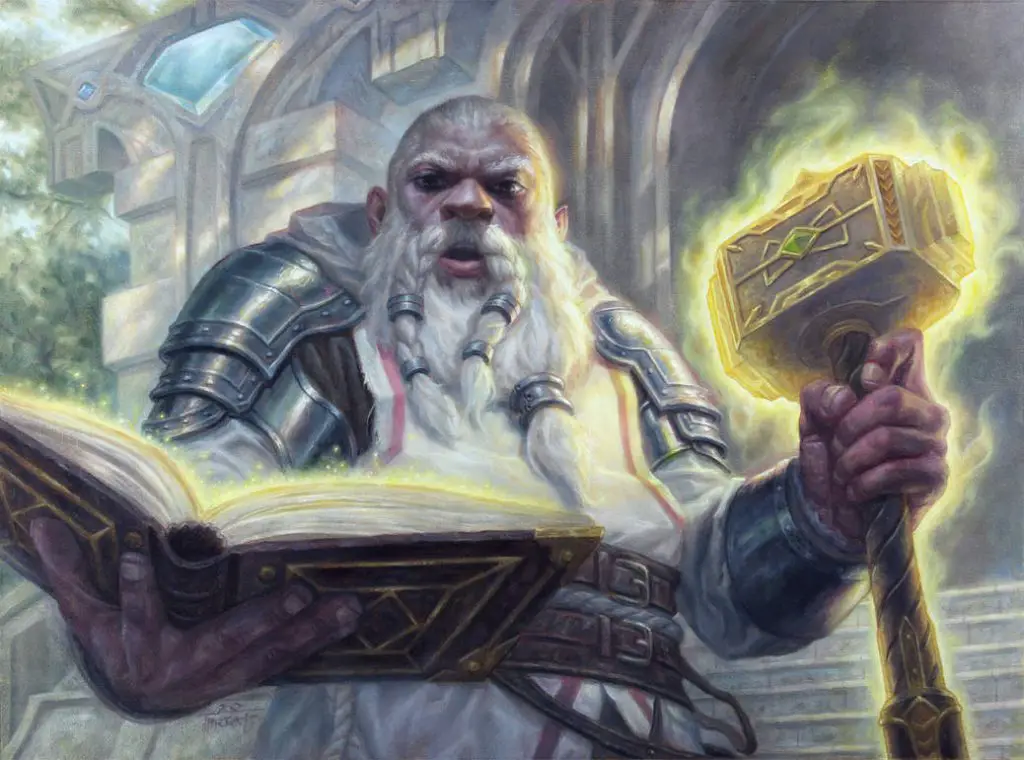
Knowledge Cleric Features 5e
I will give you a heads-up, though…
The Knowledge Cleric has a ton of features that can get very complicated very quickly. Getting the most value out of these features plays heavily towards the specific situation that you’re in.
This guide to the Knowledge Cleric in D&D 5e should be able to answer most of your questions. Additionally, I’ll be including some example situations and ideas for using certain features.
If you still have questions though, I always respond to comments and am happy to help you out!
Recommended: Turn Undead and Destroy Undead in D&D 5e
Knowledge Domain Spells
Every Divine Domain (Cleric subclass) also comes with its own unique list of bonus spells. These are called Domain Spells.
You gain these Domain Spells when you hit the level on the table below. These spells are considered to always be prepared for you and they don’t count against the number of spells you can prepare each day.
Some Domain Spell lists might include spells that aren’t normally on the Cleric spell list. In these cases, the spell counts as a Cleric spell for you and uses your Wisdom modifier as the spellcasting ability.
So, let’s check out what you get for choosing the Knowledge Domain!
| Cleric Level | Domain Spells |
| 1 | Command, Identify |
| 3 | Augury, Suggestion |
| 5 | Nondetection, Speak with Dead |
| 7 | Arcane Eye, Confusion |
| 9 | Legend Lore, Scrying |
Thoughts on the Knowledge Cleric Spell List
As expected, the Knowledge Cleric’s list is packed with divination and enchantment options.
The nature of these spells tends to be that they’re very situational but potentially game-changing when those situations arise. A single divination spell can lead to a new plot hook and several months of gameplay based on that hook.
It’s always good for someone in the party to have the Identify spell and that someone is you. This will be more useful if your DM tends to be very generous with magic items.
With timing, creativity, and a bit of luck, Command can be excellent. Use it wisely!
Suggestion is an excellent enchantment that can be used creatively to overcome tons of problems. In or out of combat, it’s a good one to keep handy.
In situations where the party is stuck and doesn’t know how to proceed, Augury can be a big help. Whether you’re trying to determine a course of action or build a strategy, this oft-ignored spell will be very helpful.
Speak with Dead can be useful, but rarely as often as you might expect. Similarly, Nondetection is really only useful when you know that an enemy is using divination magic to spy on you. Those situations are rare, in my experience.
Against enemies with a low Wisdom score, Confusion can be hilariously frustrating. However, it’s not exactly the most reliable spell, so take it with a grain of salt.
Arcane Eye gives you a great way to safely scout ahead. You can derail enemy ambushes or avoid otherwise perilous situations!
Lastly, Legend Lore and Scrying are great in the situations that they are required. The problem here is that you almost certainly won’t be needing these so often that it’s handy to always have them prepared.
Blessings of Knowledge (Level 1)
For your hard work and learning thus far, you’ll be gaining two extra languages as well as extra proficiency with Intelligence skills!
You learn two languages of your choice.
You also become proficient in your choice of two of the following skills: Arcana, History, Nature, or Religion.
Your proficiency bonus is doubled for any ability check you make that uses either of those skills.
There’s a pretty big benefit to knowing extra languages, especially in the early levels. Eventually spells like Tongues will make this mostly obsolete, but being able to speak, read, write, and understand more languages is never a bad thing.
The big draw here is the proficiency bonuses.
As long as you’ve got proficiency in one of these skills, you’re very unlikely to fail a check that relies on it.
If you take a background like the Sage option, for example, it’s possible to get this benefit for all four of those skills. You’d get proficiency in Arcana and History from the Sage background then can use Blessings of Knowledge to pick up Nature and Religion.
In the case of the Sage background, you’d also get an additional 2 languages.
Look at you, smarty-pants!
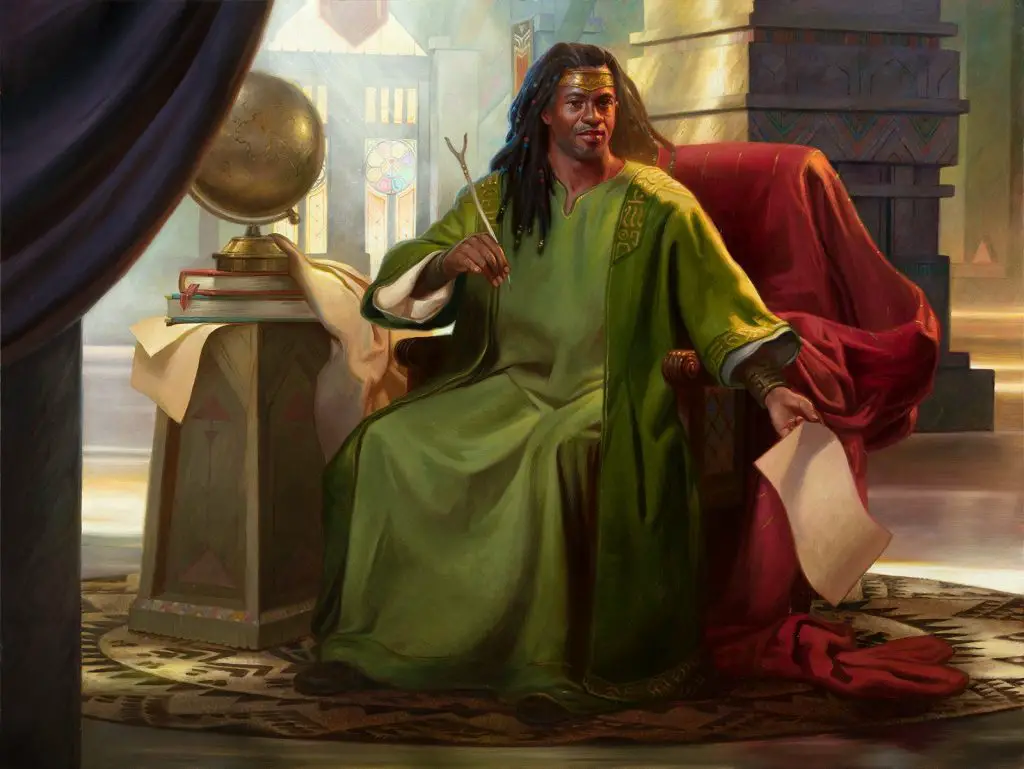
Channel Divinity: Knowledge of the Ages (Level 2)
Sometimes you find yourself in a situation that could be made SO MUCH EASIER if someone in the party was proficient in a particular skill.
In the perfect in-game version of “I read it in a book once”, you’re able to call on some divine knowledge when you need it most!
As an action, you choose one skill or tool. For 10 minutes, you have proficiency with the chosen skill or tool.
The strength of this feature is its versatility. As long as you’ve got enough time to take an action before you need to do something, you can make sure you have the best chance of doing it successfully!
That’s great for skills, but just be aware that knowing how to use a certain tool and having that tool on you are two different things. Knowing how to make the perfect disguise isn’t particularly useful if you don’t have a disguise kit!
Channel Divinity: Read Thoughts (Level 6)
It’s always nice to have options. At level 6, the Knowledge Cleric gains a new way to use their Channel Divinity!
You can use your Channel Divinity to read a creature’s thoughts. You can then use your access to the creature’s mind to command it.
To command a creature, choose one creature that you can see within 60 feet of you as an action. That creature must make a Wisdom saving throw.
If the creature succeeds on its saving throw, you can’t use this feature on it again until you finish a long rest.
If it fails its save, you can read its surface thoughts when it is within 60 feet of you. Surface thoughts include those foremost in the creature’s mind, reflecting its current emotions and what it is actively thinking about. This effect lasts for 1 minute.
During that time, you can use your action to end this effect and cast the Suggestion spell on the creature without expending a spell slot. The target automatically fails its saving throw against the spell.
In the right situation, this can be incredibly useful to have. After all, sometimes enemies or NPCs aren’t exactly forthcoming with certain information that would be helpful for you.
If you favor a bit of espionage and intrigue, you can potentially have a field day with the combination of reading someone’s mind and then magically suggesting certain courses of action to them.
You’ll get the best use out of this Channel Divinity option if you use it strategically. With proper planning and teamwork, this can open up a ton of options within just about any situation.
Potent Spellcasting (Level 8)
Like other Cleric subclasses, level 8 sees you getting a buff to your damage output.
You add your Wisdom modifier to the damage you deal with any Cleric cantrip.
Knowledge Clerics heavily prioritize spellcasting over melee combat, so getting to tack on some extra damage to your cantrips is very nice.
Sacred Flame and Toll the Dead are dependable staples for Clerics.
Hopefully, you’ve prioritized boosting your Wisdom score by this point and have gotten it to 20. At the very least, it should be 18.
Potent Spellcasting means you’re dealing an extra 4 or 5 damage (depending on your Wisdom score) with each successful hit of these cantrips. That will add up quickly!
Just be aware that this buff specifically only applies to Cleric cantrips. If you gain other cantrips from multiclassing or a feat like Magic Initiate, those won’t benefit from this.
You Might Like: D&D Ability Scores Explained
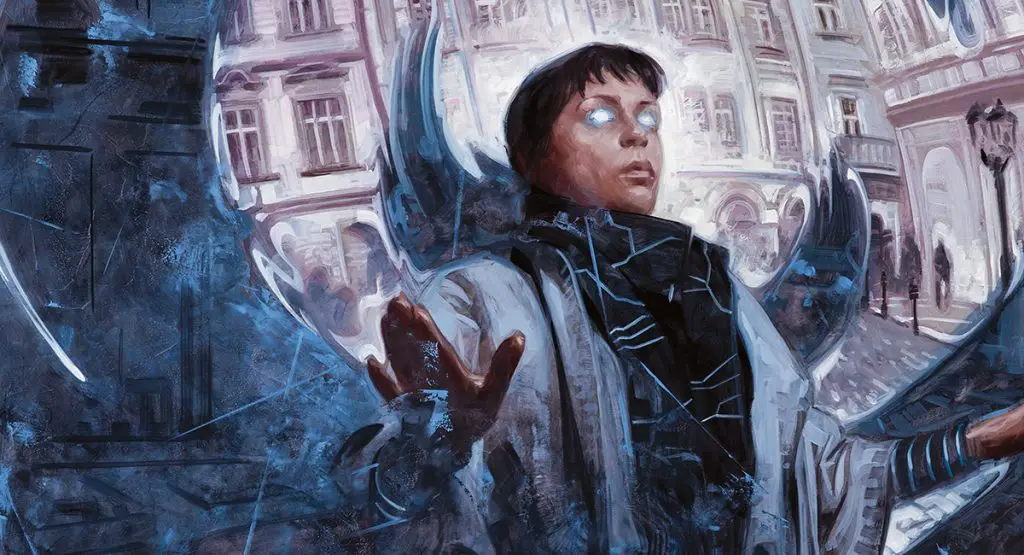
Visions of the Past (Level 17)
The Knowledge Cleric’s capstone is an interesting one with a lot to it.
Visions of the Past offers some very interesting informational utility to the party. Like some of the other Knowledge Domain features, this could very easily uncover some very interesting plot hooks and/or help the party pick up a villain’s trail.
This is honestly the kind of feature that will make many Dungeon Masters squeal with delight. It can create some incredibly powerful moments while potentially providing a tasteful and exciting way to drop a ton of lore on the party.
I’m not going to lie; this feature can be a bit intimidating when you’re reading it in the book. We’ll break it down bit by bit though, so don’t worry!
You can call up visions of the past that relate to an object you hold or your immediate surroundings.
You spend at least 1 minute in meditation and prayer, then receive dreamlike, shadowy glimpses of recent events. You can meditate in this way for a number of minutes equal to your Wisdom score and must maintain concentration during that time, as if you were casting a spell.
Once you use this feature, you can’t use it again until you finish a short or long rest.
You should have a Wisdom score of 20 at this point in the game. That means you’re able to meditate for up to 20 minutes when using this feature.
Longer meditation means you’ll be able to get more information from either type of reading you use with this feature.
Obviously, this is best used out of combat in a controlled and secure environment.
Object Reading
There is a ton of information that you can gain from certain objects with Visions of the Past.
Holding an object as you meditate, you can see visions of the object’s previous owner.
After meditating for 1 minute, you learn how the owner acquired and lost the object, as well as the most recent significant event involving the object and that owner.
If the object was owned by another creature in the recent past (within a number of days equal to your Wisdom score), you can spend 1 additional minute for each owner to learn the same information about that creature.
For example, you might meditate while holding a broken portion of a legendary hero’s sword.
This feature would allow you to see the moment where the sword broke upon slaying an Ancient Dragon that has been brought back from the dead and is threatening the entire kingdom.
Such information could be useful for a quest to reforge the legendary weapon, learn of a certain weakness that the dragon has, or something else equally epic.
Who knows? You might even learn that the one who got credit for slaying the dragon was not, in fact, the one who actually did so.
How intriguing!
Area Reading
If you instead choose to use the Area Reading option for Visions of the Past, you can learn more about past events in your area.
As you meditate, you see visions of recent events in your immediate vicinity (a room, street, tunnel, clearing, or the like, up to a 50-foot cube), going back a number of days equal to your Wisdom score.
For each minute you meditate, you learn about one significant event, beginning with the most recent.
Significant events typically involve powerful emotions, such as battles and betrayals, marriages and murders, births and funerals. However, they might also include more mundane events that are nevertheless important in your current situation.
The biggest downside to Area Reading is that 20 days isn’t exactly a long time.
For some adventures or plot hooks, that could be plenty of time but I don’t imagine that’s quite as common in most games at this tier of play. If you’re trying to learn the fate of an ancient hero, for example, this isn’t quite as “one and done” as the Object Reading can potentially be.
However, it can be very useful for learning other information. After all, you won’t always be so fortunate as to have an item that you can use for the Object Reading option.
In fact, Area Reading could very easily point you towards finding such an object so that you can get a more specific reading with your next meditation session!
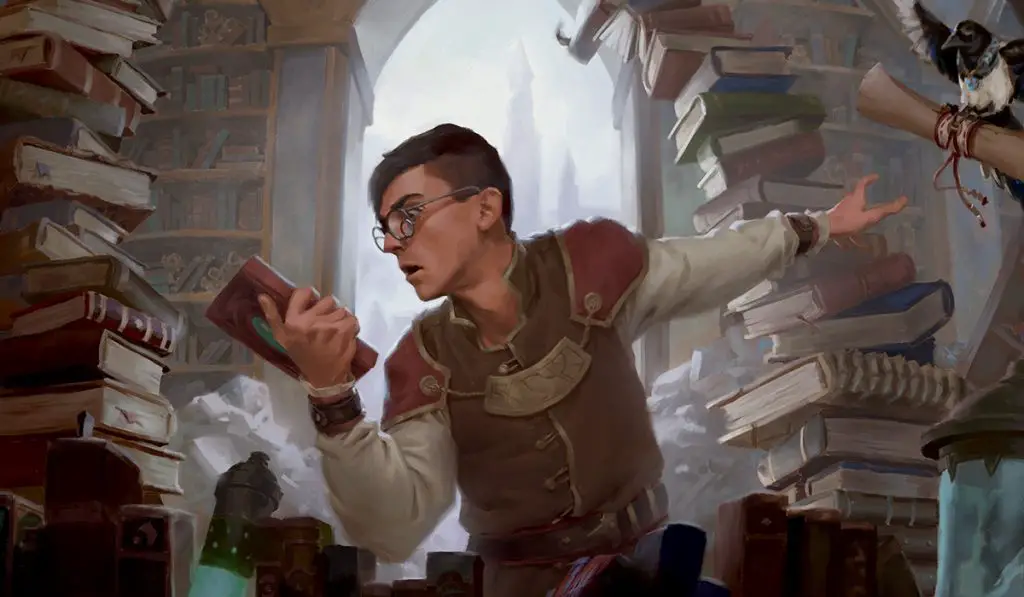
Connections
There are many ways that you can take a Knowledge Cleric and connect them to the party and story.
Viewing the adventure ahead as an opportunity for learning and documenting, it’s incredibly easy to tie a Knowledge Cleric into an adventure’s hook.
A Knowledge Cleric might have a specific goal that has required them to focus heavily on research. It might be a personal goal or something meant to help their temple or other organization.
For such a character, a question that they are desperately trying to answer can become a very useful MacGuffin for the character’s development and the adventure as a whole!
Of course, they might also believe in the idea of knowledge for the sake of knowledge. They might work diligently in creating and/or curating deeply researched scholarly works that are stored in the massive libraries that they frequent.
There’s definitely a strong pull towards the Sage background option for Knowledge Clerics. After all, these characters do tend to be more academic.
However, you can easily make most backgrounds work as the pursuit of knowledge can stem from any walk of life.
Is the Knowledge Cleric Good?
Conventional wisdom tells us that “nobody likes a know-it-all” but your party members might beg to differ!
After all, knowledge is power, right?
The Knowledge Cleric goes all-in on gathering information as a way to help the party act strategically. They’ve got so many ways to do this that it’s almost like an in-game way of tastefully metagaming.
In the right campaign/group, Knowledge Clerics can have a huge impact on the game.
Where the Knowledge Cleric suffers is that they rely pretty heavily on an adventure with a lot of information to uncover and a party that likes to approach situations with preparation and strategy.
That just simply won’t be the case for every game at every table.
Without being in a campaign that offers a lot of intrigue and lore, several of the Knowledge Cleric’s features (and basically their entire spell list) will fall flat.
The Knowledge Cleric is not a bad option, but its usefulness greatly depends on what “flavor” of D&D you and your group are playing.
Recommended: Ranking every Cleric subclass in D&D 5e!
Conclusion – Knowledge Cleric in D&D 5e
I hope you’ve found this guide to the Knowledge Cleric in D&D 5e helpful!
There’s a ton of theme and flavor to this class that can be shaped and adapted in a virtually unlimited number of ways. If you’ve got a character concept for a Knowledge Cleric or any questions about this subclass, let’s chat in the comments!
Want all the latest player guides, DM tips, news, reviews, and more for D&D 5e? Sign up for the Tabletop Joab newsletter below!
You can also follow me on Facebook and Twitter.
If you found this article helpful and want to support the site, you can buy me a coffee here! (It’s not expected, but very appreciated!)
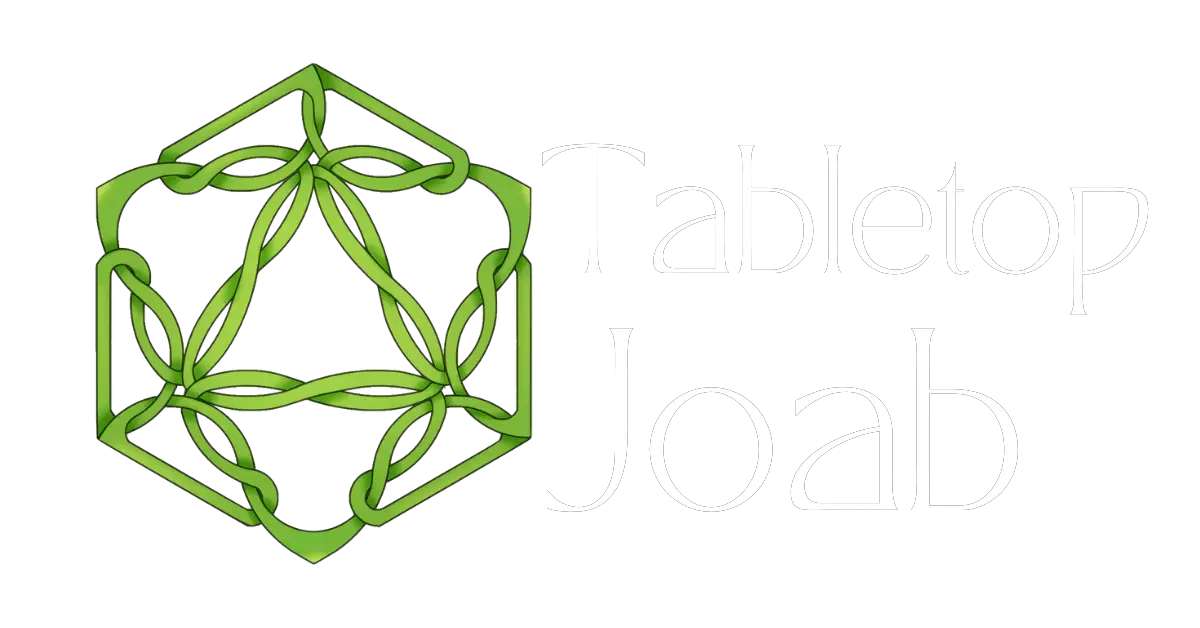
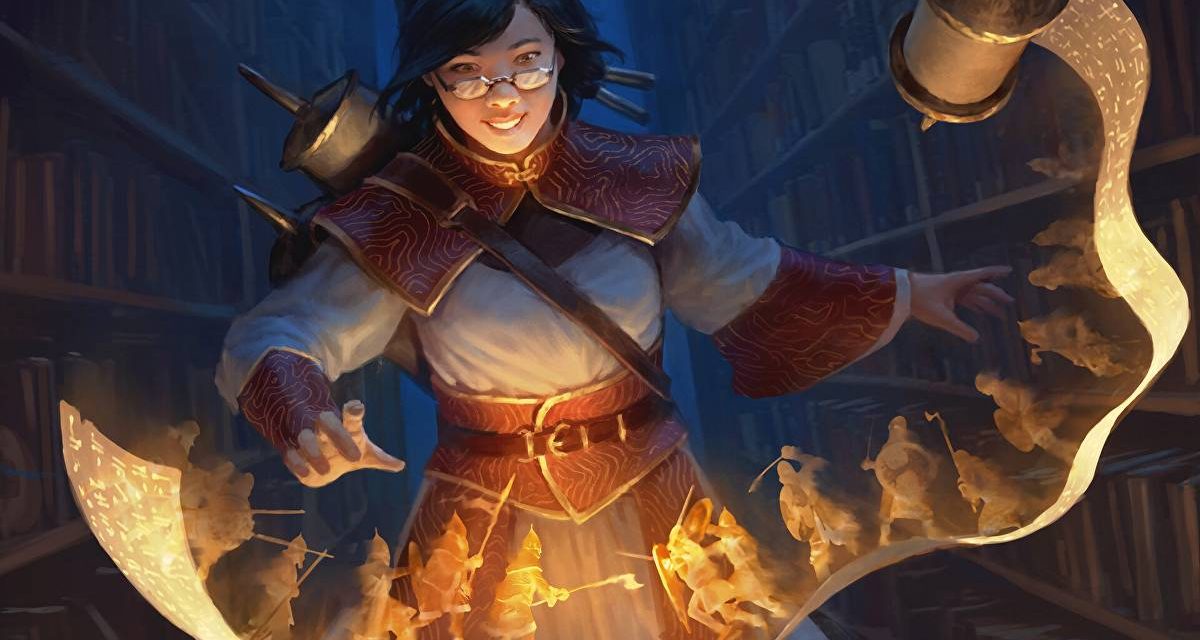








Recent Comments